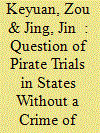|
|
|
Sort Order |
|
|
|
Items / Page
|
|
|
|
|
|
|
| Srl | Item |
| 1 |
ID:
182587


|
|
|
|
|
| Summary/Abstract |
This Survey covers materials reflecting Chinese practice in 2019 relating to: treaties, agreements and other documents signed or ratified by the People’s Republic of China; national legislation; statements made by Chinese representatives at the meetings of the UN and other international organizations, international conferences, and those made by the Foreign Ministry spokespersons, with respect to various branches of international law; and judicial decisions, in particular on the applicability and application of international conventions, by Chinese courts.
|
|
|
|
|
|
|
|
|
|
|
|
|
|
|
|
| 2 |
ID:
182585


|
|
|
|
|
| Summary/Abstract |
This article analyses the normative powers conferred on and exercised by 69 Investigative Mechanisms, including UN Commissions of Inquiry, Fact-Finding Missions and Independent Investigative Mechanisms established between 1963 and 2020. Relying on a dataset collected by the author including all their mandates (78) and reports (121), the article introduces an analytical framework and uses it to (i) identify the specific normative powers conferred on Investigative Mechanisms, (ii) the evolution and main step changes in these powers between 1963 and 2020, and (iii) their specific expression in actual practice in matters such as the use of terminology (violations/abuses of human rights by non-State actors), the determination of the standard of proof, the characterization of primary norms, the development of integrated accountability strategies, and the internalization of functions usually entrusted to prosecutorial mechanisms.
|
|
|
|
|
|
|
|
|
|
|
|
|
|
|
|
| 3 |
ID:
182586


|
|
|
|
|
| Summary/Abstract |
This case, involving the Kerch Strait and the Sea of Azov, was initiated by Ukraine against Russia under Annex VII, UNCLOS, on 1 April 2019. Having cleared the stage of provisional measures before the ITLOS, it is pending before an arbitral tribunal established under Annex VII. After the ITLOS proceedings, there is room either to broaden the scope of jurisdiction for the tribunal or to narrow it. The question of jurisdiction to be considered here reflects wider issues common to other arbitral proceedings under Annex VII. Two propositions will therefore be considered. The first is that, as the dispute may lie in the source of the supposed right for the Ukrainian warships to pass through the strait, the 2003 Cooperation Agreement may displace the UNCLOS, divesting the tribunal of jurisdiction. The second proposition is that, if the incident of 25 November 2018 involves, solely or primarily, a dispute concerning the interpretation or application of the UNCLOS, the provisions should include those of Articles 19, 25 (1), 30, 45, and 311, which provide other causes of action.
|
|
|
|
|
|
|
|
|
|
|
|
|
|
|
|
| 4 |
ID:
182584


|
|
|
|
|
| Summary/Abstract |
Many States in the world such as China have no specific domestic laws providing for the crime of piracy, leading to the question whether these States have the competence to punish piracy as required by international law. This paper argues that the lack of a crime of piracy within a domestic legal system should not become an insurmountable obstacle for States to prosecute pirates. Prosecution of pirates without a crime of piracy is feasible in a State that has domestic criminal laws that deal with illicit activities similar to piracy by indicting perpetrators with other criminal offences. While it would be an ideal solution for that State to establish a specific crime of piracy in its domestic legal system, it is important to consider the difficulties in setting the definition of piracy and the degree of punishment appropriately, and realize that the major deficiencies in punishing pirates under other existing domestic crimes can be basically addressed within an existing domestic legal system. The main purpose of universal jurisdiction over piracy to punish criminals to the maximum extent and the changing situation of piracy also require States to always be ready to deal with piracy. Therefore, prosecuting pirates as another crime is a realistic compromise. Furthermore, for a State without a crime of piracy, it is more urgent for it to build up legal grounds for exercising universal jurisdiction over piracy and relevant procedural provisions on the exercise of extraterritorial jurisdiction over international crimes at sea.
|
|
|
|
|
|
|
|
|
|
|
|
|
|
|
|
|
|
|
|
|